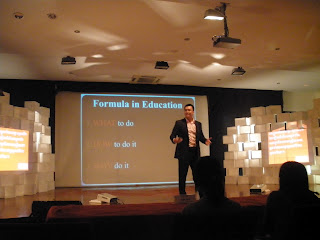Last Saturday was the second year in a row of the TEDxPhnom Penh conference. Organized by an American who has been living in Phnom Penh for the past seven years, this conference brought together artists, experts in technology, educators, and even a princess for a day-long symposium on the fast-changing scenes in Cambodia and their implications for the country's future. The theme of the conference was “Inspirations. Aspirations. Generations,” and speakers came from all over the world to share their stories and ideas. I met up with several other volunteers to go to the conference and learned a lot that I hope will help me throughout my service and beyond.
One idea I found particularly striking both because of its familiarity as well as its obscurity is that as educators it is our goal, first and foremost, to inspire. "Why" we are teaching should be guiding "what" we are teaching about. It is easy for me to lose sight of this when I am required to teach out of a book that is slightly disappointing at best and detestable at worst (EFC, or English for Cambodia, the current required text for all Cambodian classrooms). Despite this and other challenges, I think it is still possible for me to keep this idea present in my teaching ethic, and also in my relationships with my co-teachers.
A great thing about TEDx conferences is that they are born of the particular environment in which they are held, so with that come stories unique to the place. Sovathana Nana, a 25-year-old Khmer woman who has had to deal with more in her 25 years than most of us have to in a lifetime, shared hers. Typical of so many Khmer people, Nana grew up in an impoverished household with many mouths to feed and not enough food to feed them. She moved to Phnom Penh to find work so she could send money home to her family. She has worked as a counselor and interpreter, a radio presenter, led a local youth volunteer organization, and worked as a DJ and a model in her spare time... She is now the main source of income for her family and supports her siblings' private education.
Despite all the negativity that could have resulted from the many challenges her life has presented, Nana has chosen to see all of these aspects in a positive light. Because of this, she has actively sought out opportunities to improve her situation, instead of letting it weigh her down. It was inspiring to see someone who has chosen not to see her problems as hindrances and burdens, but as motivators for change and action.
Princess Norodom Soma introducing a speaker. She left Cambodia with her family during the Khmer Rouge and spent 35 years in the U.S. before returning to her homeland to learn about its culture and history.
Display from Khmer artist Loven Ramos, who moved to Manila after his parents refused to support him through a fine arts education in Cambodia. He's now returned to create art in Siem Riep and promote an understanding of art not just as decoration, but as a representation of an artist's worldview.
The talks were conducted primarily in English, but offered some in Khmer too, and had translations available throughout. Here Tep Livina, a former gangster turned academic, explains why highlighting the "why" should be more of a focus in education.
A few links to highlights from the event, and relevant information:
About the conference: http://tedxphnompenh.com/about/
Sir Ken Robinson's TED talk, "Do Schools Kill Creativity?": http://www.youtube.com/watch?v=iG9CE55wbtY
A note on censored content from the conference: http://www.phnompenhpost.com/index.php/2012061156729/National-news/rated-x-for-content.html
That's the news for now! More soon.



